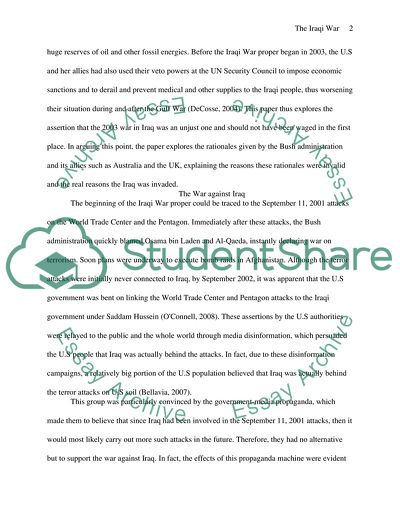Cite this document
(The 2003 War in Iraq Was Unjust Essay Example | Topics and Well Written Essays - 2500 words, n.d.)
The 2003 War in Iraq Was Unjust Essay Example | Topics and Well Written Essays - 2500 words. https://studentshare.org/military/1767705-2003-war-in-iraq-just-or-unjust-war-argumentative-essay
The 2003 War in Iraq Was Unjust Essay Example | Topics and Well Written Essays - 2500 words. https://studentshare.org/military/1767705-2003-war-in-iraq-just-or-unjust-war-argumentative-essay
(The 2003 War in Iraq Was Unjust Essay Example | Topics and Well Written Essays - 2500 Words)
The 2003 War in Iraq Was Unjust Essay Example | Topics and Well Written Essays - 2500 Words. https://studentshare.org/military/1767705-2003-war-in-iraq-just-or-unjust-war-argumentative-essay.
The 2003 War in Iraq Was Unjust Essay Example | Topics and Well Written Essays - 2500 Words. https://studentshare.org/military/1767705-2003-war-in-iraq-just-or-unjust-war-argumentative-essay.
“The 2003 War in Iraq Was Unjust Essay Example | Topics and Well Written Essays - 2500 Words”. https://studentshare.org/military/1767705-2003-war-in-iraq-just-or-unjust-war-argumentative-essay.


